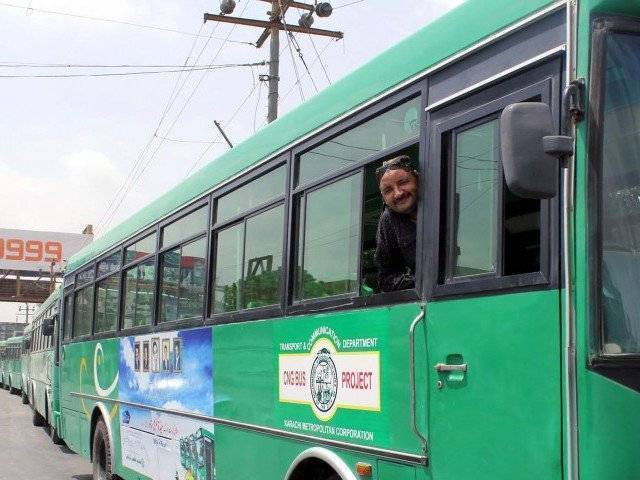BRT system to slash carbon emissions in Peshawar
Peshawar ranks second in worst air-polluted cities in the world, according to WHO report

PHOTO: APP
Thirty-one thousand tonnes of carbon dioxide emissions will be reduced in the first year of the project's operations alone.
It is estimated that by 2026 emissions will fall by 62,000 tonnes which will significantly decrease pollution-related problems.
Peshawar was ranked second in the worst air polluted cities globally as a part of a World Health Organisation (WHO) study of over 3,000 cities between 2011-2015.
With carbon dioxide levels reaching up to 540 particles per million (PPM) - which is far higher than the WHO set guidelines of 10 PPM.
The BRT system is expected to be rolled out in April and shall have a total of 35 bus stations.
The provincial government has joined hands with the Asian Development Bank (ADB) to curb carbon emissions.
It is hoped that the reduction in carbon emissions would make the city more environment-friendly.
Bus Rapid Transit: Over 0.5m Peshawar residents to use BRT every day
One of the key reasons for the support of the ADB for the project was its contribution to controlling carbon emissions.
This was stated in the Environmental Impact Assessment report of the system which had been submitted to the ADB by Peshawar Development Authority (PDA).
Under the 2015 Paris Climate Change Conference, Pakistan is a signatory along with other countries to reduce carbon emissions to combat the threat posed by climate change.
The ADB released a dispensation of Rs50 billion out of the total Rs57.7 billion cost of the project.
The ADB loan will provide technical support to the BRT system as well as the environmental assessment of the project on regular basis.
“It is estimated that 30,988 tonnes of carbon dioxide emission reductions will be observed in the first year of the project operations,'' the report states.
''While these reductions will more than double by the year 2026 to 62,145 tonnes and reach over 77,000 tonnes by 2036,” the report went on to state.
Once the 26 kilometre long BRT system which will run from Chamkani to Karhano through Soekarno Chowk is complete, more than 50,000 passengers can commute using on a daily basis using the service.
This will reduce the burden on private vehicles plying on city’s roads and will help in reduction of carbon emissions.
Moreover, the second reason for the reduced carbon emissions is employing cleaner and more fuel efficient fleet of 400 buses under the system.
The assessment report shows that there is a minimal difference in carbon emissions and resulting impact on air quality from both diesel and CNG powered buses.
“However, in terms of economic viability, there is a considerable difference in the cost of procuring CNG buses in comparison to diesel buses,” the report states.
Adil Zareef, an environmentalist based in Peshawar said the government needs to be serious about cutting carbon emissions as it poses serious threats to both health and environment.
He added that an awareness campaign is needed after launching the system in order to reduce the number of vehicles on the roads.
He said this would aid in cutting emissions released by these vehicles.
“All the stakeholders of BRT project need to be onboard as it will benefit the common man in the end of the day,” he said.













COMMENTS
Comments are moderated and generally will be posted if they are on-topic and not abusive.
For more information, please see our Comments FAQ